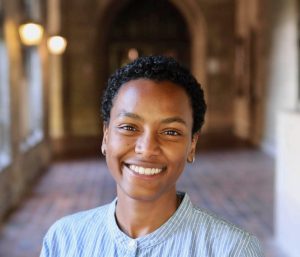
The Department of Economics is pleased to welcome Assistant Professor Fern Ramoutar to the University of Toronto. Professor Ramoutar joins the department from the Booth School of Business at the University of Chicago where she studied topics in real estate and urban economics, using tools from empirical industrial organization and applied microeconomics. In a recent paper, she investigated the impact of market power in residential real estate in the context of the Chicago rental market.
“UofT is distinctive for its innovative and critical approaches to addressing complex problems,” Ramoutar said about her appointment. “I am thrilled to continue my work in a research community that is exceptionally creative, supportive, and focused on translating research into tangible policy solutions. Toronto is also my hometown, and it is an extraordinary place in which to learn and do research about the causes and consequences of urban inequality. I look forward to making connections and building tools that serve local communities, both within the city and beyond.”
Undergraduate students who enroll in ECO333, Urban Economics, will find that Ramoutar has a student-focused teaching style that reinforces the intellectual values of the discipline and of the university.
“My goal is always to create a learning environment that feels flexible and supportive. My courses are designed to encourage students to engage critically with the material,” she explained. “I believe we should study topics that reflect the full range of experiences around us. I value diversity in my classes, and I hope to use the opportunity of having students with different backgrounds, perspectives, and learning styles to foster respectful and expansive discussions about economics.”
The real-world application and constant examination of economics concepts, tools, and research methodologies are just two of qualities Ramoutar hopes to cultivate in her students.
“I am curious and stubborn when it comes to understanding and solving problems,” she said. “I think it is important to practice asking questions even if they feel embarrassing or small, to admit when we are wrong, and to change our minds. I hope my students will learn to follow their own instincts and recognize that knowledge comes in many forms.”
That stubborn drive to question assumptions remains a feature of Ramoutar’s current projects and collaborations.
“I am excited to expand the frontier of urban economics research through new data and methodological contributions, challenge conventional assumptions, and rethink our current understandings of the relationships between people and places,” Ramoutar stated. “I am interested in projects related to market structure and competition in real estate, housing affordability, segregation, gentrification, and sustainable development.”
Return to the Department of Economics website.
Scroll more news.
